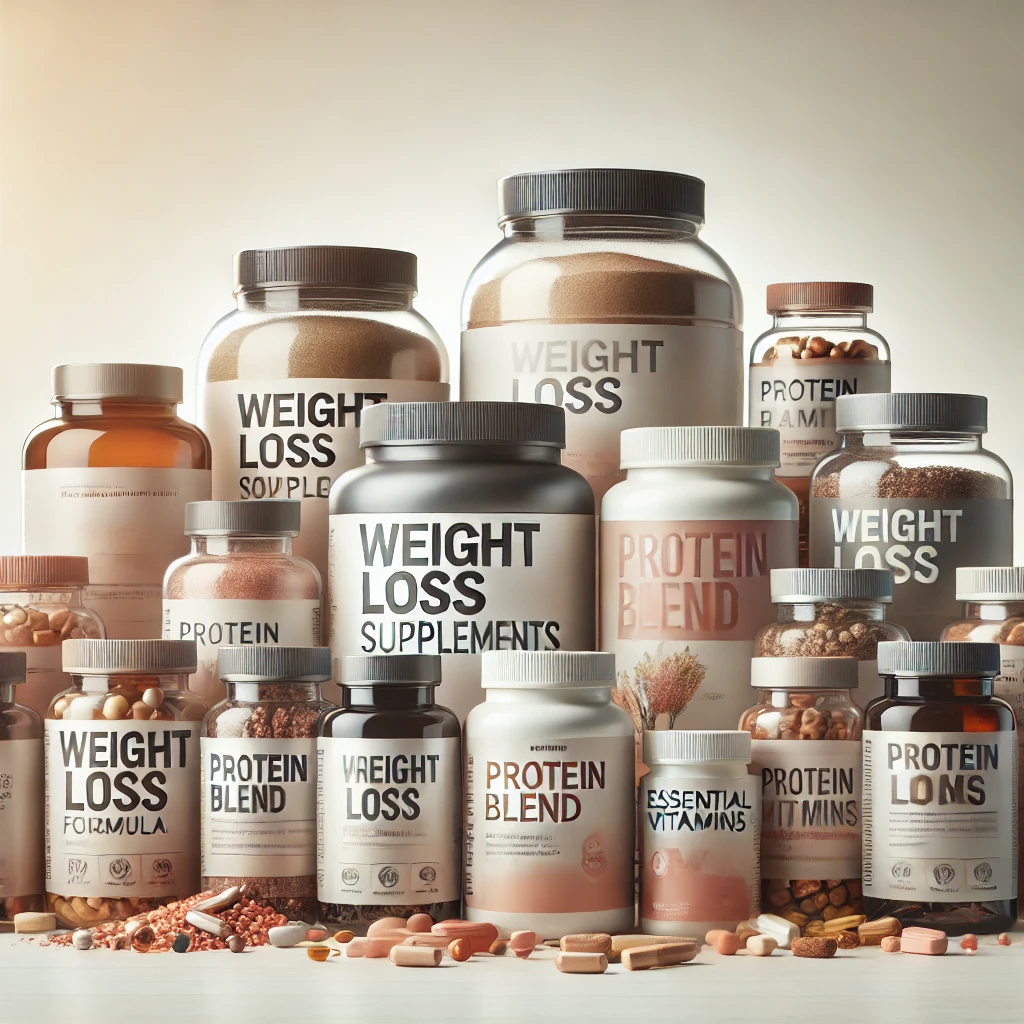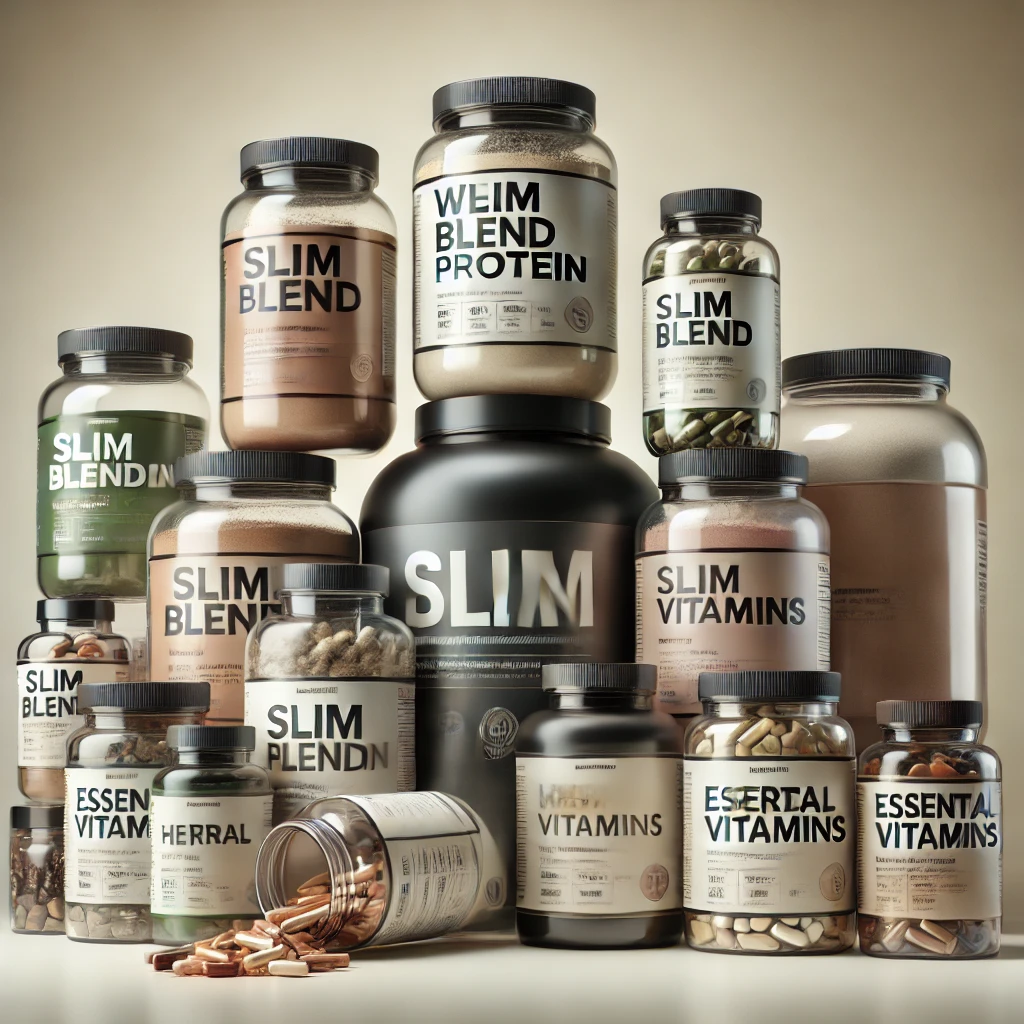Fat burning with the best protein and natural supplements for weight loss

Do Weight Loss Supplements Work?
Weight loss supplements are popular, but their effectiveness varies widely. Most over-the-counter supplements contain ingredients like caffeine, green tea extract, garcinia cambogia, or fiber, which claim to boost metabolism, suppress appetite, or increase fat burning. However, research on their efficacy is mixed. Some studies show slight benefits, but these are usually modest, amounting to only a few extra pounds lost over months when combined with diet and exercise.
Many supplements, particularly those promising rapid weight loss, lack solid scientific backing and can even be risky. Products containing high doses of stimulants like caffeine can lead to side effects, such as jitteriness, insomnia, or even heart issues. Other ingredients, like certain herbal extracts, may interact poorly with medications or have unknown long-term effects.
Sustainable weight loss generally comes from a balanced diet, regular exercise, and behavior changes rather than relying on supplements. While some supplements might support minor weight loss, they’re not magic solutions and work best when paired with a healthy lifestyle. Consulting with a healthcare provider before starting any supplement is essential, as they can provide guidance tailored to individual health needs.
Understanding the Role of Supplements in Weight Loss
What to Expect from Weight Loss Supplements
Weight loss supplements are designed to support, rather than replace, diet and exercise in a weight management plan. They generally work by boosting metabolism, suppressing appetite, or blocking fat absorption. However, the effectiveness of these supplements can vary widely depending on individual factors like genetics, lifestyle, and overall health.
Common ingredients in weight loss supplements include caffeine, green tea extract, and fiber-based products, all of which can temporarily increase metabolism or reduce appetite. While some people may experience modest results, supplements alone rarely produce significant weight loss. Additionally, many supplements come with potential side effects, such as increased heart rate or digestive discomfort, making it essential to choose reputable brands and consult a healthcare professional.
Ultimately, weight loss supplements should be viewed as a small part of a comprehensive plan that emphasizes balanced nutrition, regular physical activity, and lifestyle changes for sustainable results.

The Most Effective Supplements for Supporting Weight Loss
Several supplements are known for their potential to support weight loss by enhancing metabolism, reducing appetite, or assisting in fat burning. While none work as a stand-alone solution, certain types can complement a healthy diet and active lifestyle to help achieve weight loss goals.
1. Green Tea Extract: Rich in antioxidants called catechins, green tea extract has been shown to boost metabolism and improve fat oxidation, especially during exercise. The caffeine in green tea also aids in energy expenditure, helping to burn calories.
2. Caffeine: Often used as a stimulant, caffeine is known to increase metabolic rate and reduce appetite temporarily. Studies suggest it can enhance calorie burning, especially during physical activity.
3. Glucomannan: A natural fiber, glucomannan absorbs water and expands in the stomach, promoting feelings of fullness and reducing appetite. This can help control calorie intake, especially when taken before meals.
4. Protein Powder: Increasing protein intake supports muscle preservation during weight loss and helps manage hunger by promoting satiety. Protein also has a higher thermic effect, meaning the body burns more calories digesting protein than carbs or fat.
While these supplements may aid weight loss, they are most effective when combined with proper diet and exercise, and they should be used cautiously, with attention to recommended dosages and potential side effects.
List of effective supplement:
Protein Powders: Protein powders, such as whey, casein, or plant-based options, are popular supplements for muscle recovery, growth, and overall health. They provide a convenient way to meet daily protein needs, especially for athletes or those with higher protein requirements. They support muscle repair post-exercise and help with satiety, making them useful for both weight management and muscle building.
Green Tea Extract: Rich in antioxidants, particularly catechins like EGCG, green tea extract is known for its potential to boost metabolism and support fat loss. It may also improve cardiovascular health and provide a mild energy boost. Regular use may help reduce the risk of chronic diseases and improve overall wellness.
Caffeine: A well-known stimulant, caffeine improves alertness, focus, and endurance. It is commonly used to enhance athletic performance, as it can increase energy levels and delay fatigue. Moderate caffeine consumption has also been linked to various health benefits, including improved cognitive function and reduced risk of certain diseases.
Glucomannan (Fiber Supplement): Derived from the root of the konjac plant, glucomannan is a soluble fiber that can help with weight management. It expands in the stomach, promoting feelings of fullness and reducing overall calorie intake. It also supports digestive health and may help manage blood sugar levels.
Omega-3 (Fish Oil): Omega-3 fatty acids, typically found in fish oil, play a crucial role in heart health, reducing inflammation, and supporting brain function. Regular omega-3 supplementation is linked to reduced risk of heart disease, improved mental clarity, and better joint health. It’s particularly beneficial for those who don’t consume enough fatty fish.
Supplements You Should Avoid
When considering dietary supplements, it’s crucial to be aware of those that may be harmful or ineffective. Here are some supplements that you should generally avoid:
High-Dose Vitamin A: Excessive amounts can lead to toxicity, causing liver damage and birth defects. It’s best to avoid high-dose supplements unless prescribed by a healthcare professional.
St. John’s Wort: While popular for mood enhancement, it can interact negatively with various medications, including antidepressants and birth control pills, reducing their effectiveness.
Kava: Often used for anxiety, kava has been linked to severe liver damage, leading to concerns about its safety, especially with prolonged use.
Comfrey: This herb can cause liver damage and has been banned in many countries as a supplement due to its toxic properties.
Megadoses of Vitamins and Minerals: Over-supplementation of individual vitamins and minerals can lead to toxicity and adverse health effects. It’s best to obtain nutrients from a balanced diet.
Certain Weight Loss Supplements: Many weight loss products can contain harmful stimulants and unregulated ingredients that pose health risks.
Before starting any supplement, it’s essential to consult with a healthcare professional to ensure safety and effectiveness tailored to your individual health needs.
Avoid Supplements with Unrealistic Claims
Why Fat Burners Aren’t Always Effective
Fat burners are marketed as quick solutions for weight loss, but they often fall short of their claims. Many fat burners contain stimulants like caffeine or green tea extract, which can temporarily boost metabolism but do not lead to significant long-term fat loss. The effectiveness of these supplements is often exaggerated, relying on anecdotal evidence rather than robust scientific research.
Moreover, fat burners may encourage unhealthy habits; users might rely on supplements instead of adopting a balanced diet and regular exercise. Some products can also lead to side effects like increased heart rate, anxiety, or digestive issues, particularly when combined with other stimulants or taken in high doses.
Ultimately, sustainable weight loss requires lifestyle changes, including a nutritious diet and physical activity. Relying solely on fat burners can create false hope, leading to frustration and disappointment when the desired results aren’t achieved. As with any supplement, it’s vital to approach fat burners with caution.
Natural Alternatives to Weight Loss Supplements
For those seeking to lose weight, natural alternatives can be more effective and safer than over-the-counter weight loss supplements. Here are some options:
Whole Foods: Emphasize a diet rich in whole foods, including fruits, vegetables, lean proteins, whole grains, and healthy fats. These foods are nutrient-dense and help keep you satiated, reducing the urge to snack on unhealthy options.
Hydration: Drinking plenty of water can aid in weight loss by promoting satiety and increasing metabolism. Sometimes, our bodies confuse thirst with hunger, so staying hydrated is key.
Regular Exercise: Incorporating both aerobic (cardio) and strength training exercises can boost metabolism and help maintain muscle mass while losing fat. Aim for at least 150 minutes of moderate exercise or 75 minutes of vigorous activity each week.
Mindful Eating: Practicing mindful eating can help individuals recognize hunger cues and reduce overeating. This involves paying attention to your food, savoring each bite, and eating without distractions.
Herbal Teas and Spices: Some herbal teas, like green tea, and spices, like cayenne pepper, may have mild metabolism-boosting effects. They can be included in a balanced diet to support weight loss.
By focusing on these natural alternatives, you create a sustainable and healthy approach to weight loss.
Foods That Naturally Support Weight Loss
Herbal Teas and Natural Extracts as Alternatives
Certain foods and herbal teas can naturally support weight loss by boosting metabolism, enhancing digestion, and promoting feelings of fullness. Here’s a look at some effective options:
Foods That Naturally Support Weight Loss:
Leafy Greens: Vegetables like spinach, kale, and Swiss chard are low in calories and high in fiber, which helps keep you full and reduces overall calorie intake.
Lean Proteins: Foods such as chicken breast, turkey, legumes, and fish promote satiety and require more energy to digest, which can boost metabolism.
Whole Grains: Foods like quinoa, brown rice, and oats are rich in fiber, which aids digestion and keeps you feeling full longer compared to refined grains.
Berries: Fruits like strawberries, blueberries, and raspberries are low in calories and high in antioxidants, which may help reduce inflammation and support metabolic health.
Avocados: High in healthy fats and fiber, avocados help you feel full and satisfied while providing essential nutrients.
Herbal Teas and Natural Extracts as Alternatives:
Green Tea: Rich in catechins, green tea can help boost metabolism and increase fat burning, particularly during exercise.
Peppermint Tea: This can aid digestion and may help reduce appetite, making it easier to control cravings.
Ginger Tea: Known for its anti-inflammatory properties, ginger can enhance metabolism and promote feelings of fullness, helping to curb appetite.
Cayenne Pepper Extract: Capsaicin, the active component in cayenne, has been shown to increase calorie burn and reduce appetite.
Chamomile Tea: While known for its calming effects, chamomile may also improve sleep quality, which is important for weight management.
Incorporating these foods and herbal alternatives into your diet can create a balanced approach to weight loss that is both effective and sustainable.

How to Safely Use Supplements for Weight Loss
When considering supplements for weight loss, safety and effectiveness should be prioritized. Here are some guidelines to help you use these products wisely:
Consult a Healthcare Professional: Before starting any supplement, speak with a healthcare provider or a registered dietitian. They can help determine if a supplement is appropriate for you based on your health history and needs.
Choose Reputable Brands: Look for supplements that are from well-known, reputable manufacturers. Check for third-party testing or certifications to ensure product quality and safety.
Read Labels Carefully: Pay attention to the ingredients and dosages. Avoid products with excessive amounts of stimulants or unverified ingredients. Familiarize yourself with any potential side effects or interactions with medications you may be taking.
Combine with Healthy Habits: Supplements should complement a balanced diet and regular exercise, not replace them. Focus on whole foods, hydration, and physical activity to support your weight loss goals.
Monitor Your Body’s Response: Keep track of how your body reacts to the supplement. If you experience adverse effects or do not see results within a reasonable timeframe, discontinue use and consult your healthcare provider.
By approaching weight loss supplements with caution and informed practices, you can enhance your weight loss journey safely.
Meal Prep for Weight Loss: How to Plan and Prepare Healthy Meals in Advance
Consulting a Doctor Before Starting Supplements
How to Combine Supplements with Diet and Exercise for Best
When considering supplements for weight loss, safety and effectiveness should be prioritized. Here are some guidelines to help you use these products wisely:
- Consult a Healthcare Professional: Before starting any supplement, speak with a healthcare provider or a registered dietitian. They can help determine if a supplement is appropriate for you based on your health history and needs.
- Choose Reputable Brands: Look for supplements that are from well-known, reputable manufacturers. Check for third-party testing or certifications to ensure product quality and safety.
- Read Labels Carefully: Pay attention to the ingredients and dosages. Avoid products with excessive amounts of stimulants or unverified ingredients. Familiarize yourself with any potential side effects or interactions with medications you may be taking.
- Combine with Healthy Habits: Supplements should complement a balanced diet and regular exercise, not replace them. Focus on whole foods, hydration, and physical activity to support your weight loss goals.
- Monitor Your Body’s Response: Keep track of how your body reacts to the supplement. If you experience adverse effects or do not see results within a reasonable timeframe, discontinue use and consult your healthcare provider.
By approaching weight loss supplements with caution and informed practices, you can enhance your weight loss journey safely.
How to Boost Your Metabolism for Faster Weight Loss.
Lorem ipsum dolor sit amet, consectetur adipiscing elit. Ut elit tellus, luctus nec ullamcorper mattis, pulvinar dapibus leo.
